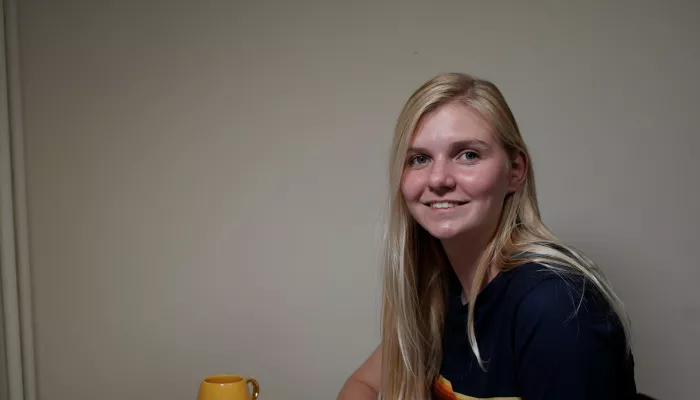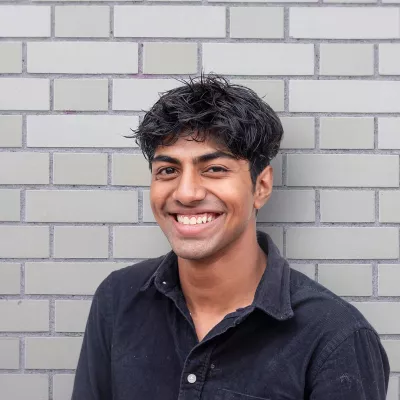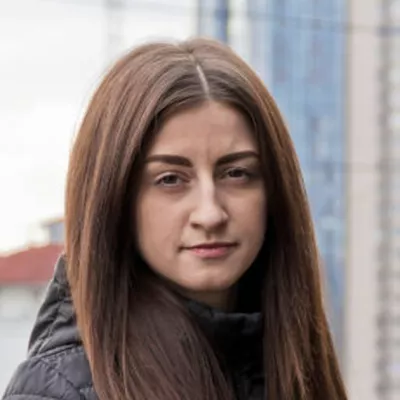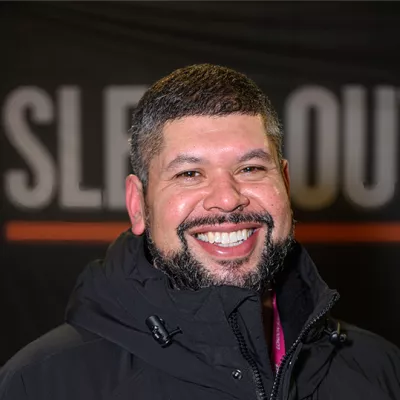After her parents were unable to care for her, Carrie entered the care system age six. Her first foster placement lasted until her early teens, but a sexual assault sent her spiralling, and she began dealing with the trauma through drugs and alcohol. Between the ages of 13 and 18, Carrie had 11 different foster placements.
Today, Carrie lives in her own flat with her three-year-old daughter and receives floating support from Centrepoint. She has just started a degree in social work.
A difficult beginning
Carrie* was born into a family of eight: mum, dad, and five older siblings. Her mother suffered with her mental health and was in and out of hospital, and her father was a heavy drinker. Together they were unable to adequately care for Carrie and her siblings, and by the age of six she was placed in foster care.
Carrie was able to stay in the same foster placement until her early teens, but after a particularly traumatic event, life changed for her. The untreated trauma left Carrie susceptible to exploitation, and she subsequently became a victim of grooming.
Being groomed
“I was raped at 13. I went off the rails – I got in with the wrong crowd and started taking drugs. I was friends with a couple of girls and they’d started hanging out with a group of men. They introduced me. We didn’t realise we were being exploited.”
Carrie’s deep-seated feelings of abandonment left her vulnerable. “I felt like no one really loved or cared about me. I think because of that, I craved attention wherever I could get it."
“They made us feel like we were the centre of their universe. They provided drugs and alcohol, but with all that came the sexual side. They slept with us; they took us to different cities for their friends to sleep with us. Now it makes me feel disgusting, but at the time, even though it was such a negative type of attention, it was still attention.”
Her long-term foster placement reached its breaking point; she moved around a lot after that. Between the age of 13 and 17, Carrie predicts she had around 11 different foster placements. The underage grooming meant she also had to be placed under a public protection order: “I wasn’t able to see anyone. My friend died from Leukaemia when I was in there and I wasn’t able to go to the funeral.”
Rough sleeping
At 15, Carrie ran away from one foster placement and slept on the streets for about four weeks.
“I remember sleeping by the train station. [My friend and I] would sit on the platform or in the toilets and curl up together just to keep warm. Other times we would sleep in shop doorways. Even though it was horrible and cold and I didn’t have any spare clothes, in my head it was still better than what I had run away from.”
Despite staying away from exposed areas to avoid police, they were eventually picked up.
Drugs and mental health
Carrie had been cared for under the Children and Young People's Mental Health Services (CAMHS) from a young age, but her disillusionment with the service meant she found it hard to open up. “They always used to say, ‘We know how you’re feeling,’ but they didn’t. They’d learnt it all in a book – they hadn’t been through it themselves.”
As a result, Carrie shut herself off, retreating even further into drug use and self-harm to help block out the trauma: “I didn’t even like the way that drugs made me feel, it just numbed me.” It wasn’t until a youth worker from Young Addiction revealed the real toll this trauma was having on her health that her mindset began to shift.
“He was the only worker I really connected with. He said that if I continued to take that amount of drugs, it was unlikely that I would be alive in the next year. That really scared me. Even though I blamed my mum for a lot of things, I didn’t think she deserved to bury her daughter. That’s what made me stop taking drugs.”
Carrie’s last placement broke down age 17. As it’s particularly hard to get a young person into a foster placement when they’re on the cusp of turning 18, Carrie moved back in with her mum – something Carrie calls a “blessing”: her mum’s illness and disability meant Carrie stayed in and cared for her, helping with her recovery from drugs.
A new start
A month after her 18th birthday, Carrie was given a council flat of her own. She lacked many of the life skills necessary to manage living independently, so her Leaving Care Coach referred her to Centrepoint, who have provided her with floating support for the past four years.
“They helped me understand bills and benefits, budgeting. They offered support for my mental health. My anxiety used to be so bad that I found it hard to get outside, so sometimes they’d take me to my appointments. My floating support workers were both so helpful. [My support worker] Lisa’s dropped round food parcels round when finances have been really tight.”
It was around this time that Carrie fell pregnant with her daughter, Maya. “I fell pregnant really quickly. Because of all the abuse I suffered at the hands of my ex, I didn’t think I’d be able to carry a child.
“My daughter’s dad had his life together and it was stability I’d never had before. But he already had two sons and didn’t want more. I saw it as maybe my only opportunity to have a child. When you come from a broken family, you just want the family unit you’ve always craved. We stayed together for a while, but it broke down eventually.”
Cancer and university
As if she hadn't had enough to deal with, after Carrie had her daughter, she was taken into hospital for some tests due to excessive bleeding, A biopsy showed she had stage 1 cervical cancer.
“I remember just crying – I’ve got everything I’ve always dreamed of and now my child might grow up without a mum, the same way I did. I was really scared.”
Carrie went through seven weeks of radiotherapy and was eventually given the all-clear. The positive prognosis helped her to start looking to the future.
“It made me feel different. I didn’t feel sorry for myself or my situation anymore. I didn’t care about my past, I was just so determined to be everything for my daughter."
"I thought, If I were to die there and then, what would I have to show for my life? Nothing, really. It really changed my mindset. I wanted to be the best mum, to provide for her and give her stability.”
Maya started nursery aged two, and Carrie used this time to apply for an Open University course in Social Care. “I got distinctions in all my assignments and got my diploma. I've just started my degree and have had support from the Centrepoint Bursary."
Throughout this time, Centrepoint have continued to provide support for Carrie, working with her to make sure she has everything she needs to continue her education.
“My key worker helped me apply for funding for my diploma – she’s really supportive, always coming to visit and making sure I’m okay. She’s also helping me sort out my finances for uni as I will have to come off universal credit and apply for student finance and a bursary.”
Looking forwards to Christmas and beyond
Carrie says that the hardest thing about Christmas growing up in foster care was not being able to spend it with family like everyone else.
“Christmas in a care home is different from being with a proper family. It can be triggering. Christmas is such a family time to celebrate. It’s a time for love and building special memories. It just makes you feel more alone and unwanted.”
Today, however, Carrie looks forwards to the festive season.
“I love it now. I feel like I get to make up for all my childhood Christmases where it wasn’t special like it should have been. I get excited for my daughter and I get to feel that love and provide those things for her that I hoped for. I live for Christmas now. It makes up for all those other ones.”
And as for beyond the festive period, Carrie is feeling optimistic, reflecting on her experiences as an opportunity to help shape her future.
“I see things very differently now. I was a really angry child. I blamed everyone. I blamed my mum; I blamed social services because at times they put me at risk. I was angry and that’s why I rebelled, because I didn’t care. I was horrible to all my social workers; I made them cry. Now I’m older, it’s different. In a way, I’m glad I went through all of that because it’s made me a really good person.”
We are so proud of how far Carrie has come and although things can still be a real struggle for her, she is doing everything she can to continue to push herself forwards.
*names have been changed




 David Monteith-Hodge - Sleep Out 2023
David Monteith-Hodge - Sleep Out 2023